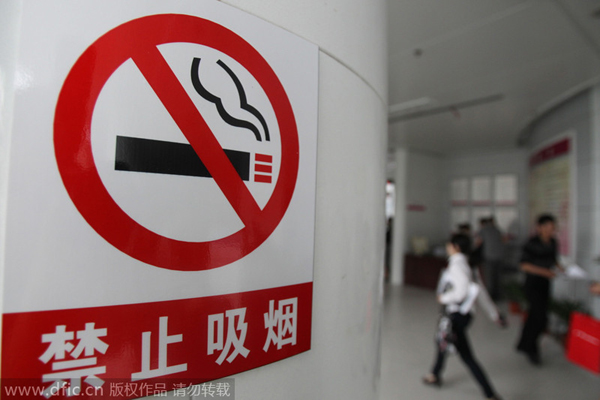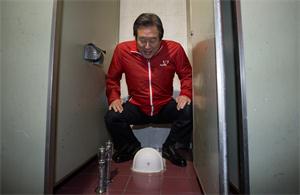Capital needs to make smoking ban work
(China Daily) Updated: 2015-05-12 07:46
 |
|
A no-smoking sign at a hospital in Nantong city, Jiangsu province, May 18, 2011. [Photo/IC] |
Beijing announced on Monday, people can use three gestures to show their objection to those smoking in public venues. One is to put a hand over one's mouth to tell a smoker that one minds him or her smoking. The other is to stick two fingers beneath the palm of the other hand to ask the smoker to stop smoking and the third is to hold the raised palm out toward the smoker to say no. The announcement came 20 days before the capital's most severe smoking ban takes effect on June 1.
Beijing issued its first smoking ban in indoor public venues in 2010. However, there has been much to be desired when it comes to its implementation. There are still many smokers who defy the ban and smoke wherever they want. And it is also difficult for some public venues such as restaurants or coffee shops to stop customers from lighting their cigarettes.
The new tobacco control regulations are a lot more severe than their predecessors. The fine for those who defy the rules can be as high as 200 yuan ($32), which is 20 times higher than the fine specified in the old rules. The smoking ban has also been extended to kindergartens, primary and middle schools, hospitals, museums and other public places.
It is indeed necessary for the capital to ban smoking in public venues. The number of smokers is more than 5 million in the city. It is all too common to see smokers taking a drag of their cigarettes in public places without ever thinking of how others feel about their smoking or how harmful their habit may be to the health of others.
Yet, it is one thing to have a set of severe regulations to ban smoking. It is completely another for the regulations to be implemented to the letter. The next, and most important, thing the city has to do is work out ways for those smokers who defy the ban get the punishment they deserve.
This will not be easy. It is unrealistic to expect all non-smokers to rise up and say no to smokers who light their cigarettes in public venues. But something that can be realistically done is for law enforcers to irregularly make inspections of public venues to catch those breaking the ban. If those caught are punished according to the law it will act as a deterrent to others.











